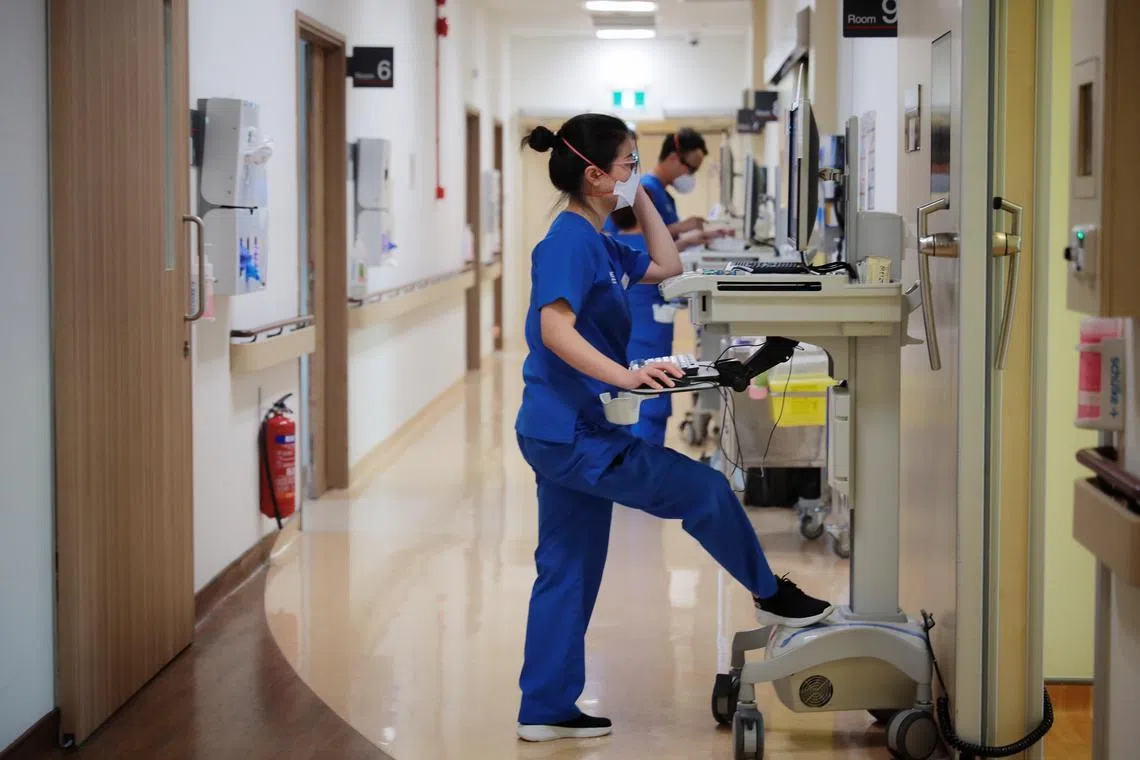$15,000 sign-on bonus for fresh nursing grads, hundreds of beds added, to help ease hospital crunch
Sign up now: Get ST's newsletters delivered to your inbox

The measures aim to tackle healthcare demands that have shot up post-pandemic and are expected to continue rising.
PHOTO: ST FILE
Follow topic:
SINGAPORE – Nursing manpower will get a major boost and hundreds more hospital and rehabilitative care beds will be added by the end of 2023 to alleviate the capacity crunch at public hospitals.
The broad swathe of measures to help the sector cope with crowded wards and long waiting times includes attracting new nurses with a $15,000 sign-on bonus, as well as expanding rehabilitation or step-down care beds for those who no longer need acute care and may be waiting for a nursing home bed.
Health Minister Ong Ye Kung announced these efforts at the Nurses’ Merit Award (NMA) ceremony at Orchard Hotel on Wednesday, where he conferred the award on 125 nurses.
The measures aim to tackle healthcare demands that have shot up post-pandemic and are expected to continue rising as Singapore’s population ages rapidly.
The world outside of the hospitals is in Dorscon green, as life has gone back to normal, but within the hospitals, there are more seniors, more complex cases, more with co-morbidity issues, said Mr Ong. Under the Disease Outbreak Response System Condition (Dorscon), green indicates that a disease is mild or not spreading easily.
Patients are staying longer. The Ministry of Health has said that over the pandemic, the average length of stay has gone up from 6.1 days to seven days, which contributes to a significant 15 per cent increase in occupancy.
“Our hospital wards are therefore often full. Emergency Departments feel it very strongly. At KKH (KK Women’s and Children’s Hospital) now, every day feels like Chinese New Year,” said Mr Ong.
“Singapore is not alone... It is a new world of healthcare that the world woke up to from the pandemic. Our experience is shared throughout OECD (Organisation for Economic Cooperation and Development) countries. In countries such as the UK (United Kingdom) where investment in healthcare could not keep up with demands, the situation is quite grave. There’s a seven-million patient waiting list.”
To tackle the capacity crunch, MOH will add 280 acute hospital beds, which will come mainly from the opening of the Tan Tock Seng Hospital-Integrated Care Hub
It will boost the number of virtual wards known as Mobile Inpatient Care at Home or MIC@Home, from approximately 100 to 200 beds. This allows patients who require acute hospital care to have their active medical issues managed through the delivery of care in their homes.
There will be an increase in step-down care facilities for patients who no longer require acute inpatient care or are awaiting admission into a nursing home, for instance.
More Transitional Care Facilities (TCFs), which were developed during Covid-19 to care for patients who are stable and awaiting their final discharge destination, will be opened in 2023.
One will be in the West near Ng Teng Fong General Hospital, and another two will be in the central region. These will add about 340 beds, which allows acute beds in hospitals to be freed up for patients receiving acute or medical care.
Nursing home capacity will be increased by another 310 beds by the end of 2023, as a new nursing home opens and two existing ones expand.
“Community hospital beds, plus TCF beds, plus nursing home beds all together add up to almost 800 step-down or rehabilitative care beds. If we can successfully transfer acute patients who do not need clinical acute care to these new and more appropriate settings, it is equivalent to adding one new regional hospital to our system by the end of this year,” said Mr Ong.
Meanwhile, the Woodlands Health Campus
Importantly, the increased capacity would mean greater need for nursing manpower.
The attrition of nurses in 2023 has so far reverted to pre-Covid-19 levels of 5 per cent to 7 per cent, after shooting up to about 10 per cent during the pandemic, when there was intense competition for nurses, he said.
Mr Ong said the sector is on track to exceed the target of hiring 4,000 nurses in 2023. This is 40 per cent more than pre-pandemic annual levels, and will help to replace the nurses who left during the pandemic, as well as help expand the nursing workforce.
In the first half of the year, public healthcare institutions collectively hired about 2,000 new nurses, and they are expected to hire close to 4,000 by the end of the year, he noted. The number will be higher when private sector hires are included in the count.
To attract more new nurses, the three public healthcare clusters recently enhanced their sponsorships for nursing studies in the local institutes of higher learning to encourage more students to take up nursing jobs in the clusters upon graduation.
Fresh local nursing graduates who have not taken a sponsorship or scholarship, and are going into nursing in the public healthcare clusters or publicly funded residential community care organisations like nursing homes, can get a sign-on bonus of $15,000, to be paid out over two years.
Mr Ong also added, to applause from the room of awardees, that his ministry is looking into a long-term retention scheme for nurses, and will share details when ready.
The Nurses’ Merit Awards recipients are from the community care sector, private hospitals and public healthcare institutions, and were chosen for their performance, participation in professional development and contribution to raising the bar for the nursing profession. They each received a medal to wear on their uniform and a cash prize of $1,000.
One of the awardees, Ms Melissa Fong, an assistant nurse clinician at Methodist Welfare Services (MWS) Home Care & Home Hospice, said the nursing shortage is felt intensely, and they have at times had to reject patients because they were overloaded.Yet, community care may not be a good fit for everyone. Hence, any move to strengthen nursing manpower would help greatly, especially after the exodus of foreign nurses in the past few years, she said. “It’s an exciting time to be in nursing,” said Ms Fong, who completed a master’s degree in palliative care at King’s College London after joining MWS.


